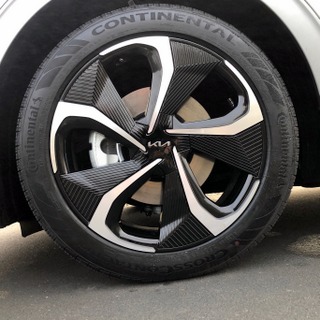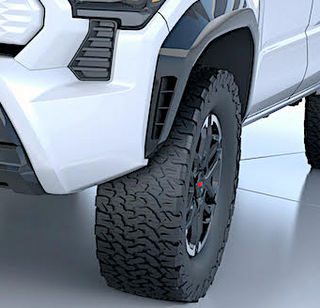EVs Are Low Maintenance, But Still Need Care
Switching to an electric vehicle has a spectrum of benefits. In addition to being environmentally friendly, they reduce fuel expenses, improve your image and eliminate some maintenance concerns. However, they run through tires faster than conventional vehicles.
Regular tires wear out roughly 20% faster on an EV than on an internal combustion engine (ICE) vehicle. Many EVs today come with specialized tires, but even these typically need more frequent changes than traditional versions. Why is that?
Why EVs Need Special Tires

EVs need special tires because they put more pressure on them than ICE vehicles. First of all, EVs are heavier. Ford’s F-150 Lightning weighs 1,600 pounds more than a similar conventional F-150. This extra weight, which comes mainly from heavy batteries, means tires have to deal with more resistance as they drive.
Electric motors also deliver more torque than their gas and diesel counterparts. Torque delivery is also instantaneous in an EV, placing immediate and heavy pressure on the car’s tires as the driver presses the accelerator. EV tires typically feature better grip to deal with this torque, but that friction comes at the cost of faster wear and tear.
Some steps can help reduce the impact of these factors. Regularly rotating your tires at least every six months helps them last longer> New technologies are creating even more durable options. Still, at least for now, driving an EV means more frequent tire changes.
Maintenance Upsides of EVs

While EV tires may not last as long, these vehicles make up for it in other ways. Generally speaking, they require much less maintenance than their ICE counterparts, primarily due to fewer moving parts. Oil, spark plug and drive belt changes, transmission servicing and gasket replacements all become a thing of the past.
The battery in an EV requires far less maintenance than a combustion engine. It still requires periodic checks, but it won’t need inspection nearly as often as a conventional engine. This results in time and money savings.
Thanks to regenerative braking, EV brakes also last up to twice as long. The regen process uses the vehicle’s kinetic energy to slow it down, storing that power as added electricity in the battery. As a result, there’s also less pressure on the brakes, so you won’t have to change them as often.
Electric Vehicles Have Unique Maintenance Needs
Electric vehicles need maintenance, just like any other machine. However, their repair schedules look different than those most drivers and companies are used to.
EVs may run through tires faster, but they require less maintenance overall. Switching to an EV can dramatically reduce repair time and costs, as long as the parts that need regular attention are serviced regularly.
Story by Martin Banks
More by Martin Banks
Seasonal Tips: Getting the Best Range from Your EV
Feature: 5 Innovative Concept Cars
Feature: How To Make Your EV Your Own
Feature: Storing Your EV for an Extended Period
History: Electric Cars’ Golden Age

Nokian does not agree: https://www.nokiantyres.com/company/news-article/there-is-a-common-misconception-related-to-electric-cars-in-reality-tires-will-last-for-a-long-time/
@bjorn,
I see your point and will allow the shameless plug because those tires are only available at five dealers in the U.S. My only questions are:
1. The tire wear issue is based on the physics of a heavier vehicle (compared to an ICE one) and meant in a head-to-head (same type of vehicle with same tires).
2. The only counterpoint to this conventional wisdom comes from companies trying to sell you their special EV tires, usually without supporting data.
Draw your own conclusions, but I’ll stand by our story and wait for more conclusive data from the field from independent sources. –Ed.
Without drawing a conclusion? The data are already there, Nokian is also right. Those specialized tires are nothing else than tires with the mentioned “XL”, which means Extreme Load, which is like you said, EVs are heavier. Using XL tires, (or Reinforced) tires are ‘extra load’ tires – they indicate that a tire is reinforced to be able to withstand a higher load than other tires of the same size. This is done in a number of ways, but most usually by adding strengthening material to either the tire’s bead or face. If you stick with Xl tires, you might possibly last longer than standard ICE cars, but it also depends on the way you drive as EVs can be powerful cars.
@Michel Good points, but won’t the XL tires cost more and wear quicker because an EVs extra weight? (asking for a friend)